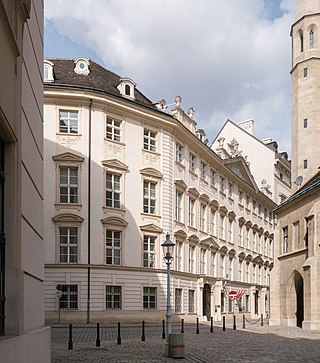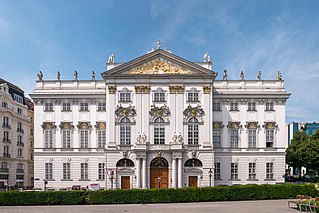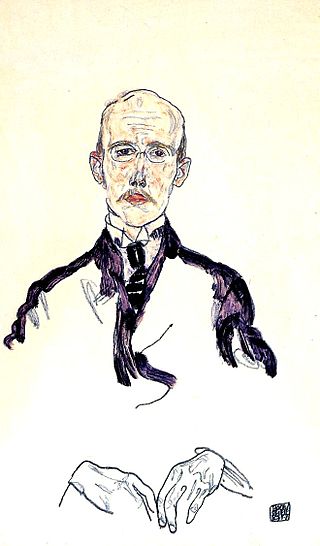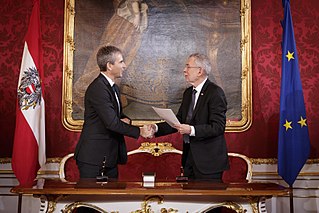The Grand Austrian State Prize is a decoration given annually by Austria to an artist for exceptional work. The recipient must be an Austrian citizen with a permanent residence in Austria.

The Federal Ministry of Justice, abbreviated BMJ, is a cabinet-level ministry of the Federal Republic of Germany. Under the German federal system, individual States are most responsible for the administration of justice and the application of penalties. The Federal Ministry of Justice devotes itself to creating and changing law in the classic core areas related to Constitutional law. The Ministry also analyzes the legality and constitutionality of laws prepared by other ministries. The German Federal Court of Justice, the German Patent and Trade Mark Office (GPTO), and the German Patent Court all fall under its scope, including affairs on court administration. The ministry is officially located in Berlin.

Ballhausplatz is a square in central Vienna containing the building that for over two hundred years has been the official residence of the most senior Austrian Cabinet Minister, the State Chancellor, today the Chancellor of Austria. As a result, Ballhausplatz is often used as shorthand for the Austrian Federal Chancellery. Until 1918 the Foreign Ministry of Austria-Hungary was also housed here. Similar to Downing Street or the Hotel Matignon, the word Ballhausplatz is a synecdoche for the seat of power.

The Ministry of Foreign Affairs is the government ministry of Austria responsible for diplomatic missions and immigration, the administration of foreign policy, and the maintenance of the country's relations with international organisations, especially the European Union. It oversees the Austrian embassies, consular representatives and other emissaries, and administers the naturalisation process and handles citizenship questions along with the Interior Ministry.
The Austrian State Prize for European Literature, also known in Austria as the European Literary Award, is an Austrian literary prize awarded by the Federal Chancellery for Arts, Culture, and Media to European writers. Established in 1965, the prize is endowed with a purse of 25,000 €. The prize was not awarded in 1969. It is awarded on the Salzburg Festival.
The Federal Ministry of Defence of Austria is the ministry in charge of all matters relating to military affairs, especially the Austrian Armed Forces. It is Austria's ministry of defence. Its current minister is Klaudia Tanner.

The Federal Chancellery of Austria is the ministry led by the chancellor of Austria. Since the establishment of the First Austrian Republic in 1918, the Chancellery building has served as the venue for the sessions of the Austrian cabinet. It is located on the Ballhausplatz in the centre of Vienna, vis-à-vis the Hofburg Imperial Palace. Like Downing Street, Quai d'Orsay or – formerly – Wilhelmstrasse, the address has become a synecdoche for governmental power.

The Ministry of Education is the government ministry of Austria in charge of public schools and academic institutions.

The Ministry of Justice is the government ministry of Austria responsible for the administration of justice. The ministry exercises administrative supervision and is charged with the compensation of the judiciary and the prosecutors, manages their office buildings and facilities, and administers the prison system.

The Ministry of Climate Action, Environment, Energy, Mobility, Innovation and Technology is the government ministry of Austria in charge of traffic, research, innovation, energy, and environmental protection.

Karl Mayländer was an Austrian art collector and businessman who was deported in 1941 from Vienna to Łódź, in German-occupied Poland, by the Nazis and later murdered in the Shoah.

In Austrian politics, the Federal Ministry of Agriculture, Regions and Tourism is the ministry in charge of agricultural policy, forestry, hunting, fishing, viticulture and wine law, postal and telecommunications services, mining, animal welfare, and the tourism industry. The Ministry was first created in 2000 through a merger of the Ministry of Agriculture (Landwirtschaftsministerium) and the Ministry of Environment (Umweltministerium); it gained responsibility for the energy sector, mining, and tourism under the first Kurz cabinet in 2018.

In Austrian politics, the Federal Ministry for Digital and Economic Affairs is the ministry in charge of promoting commerce and industry, overseeing public works, and maintaining the public infrastructure. In some recent cabinets, it has also been responsible for employment; in others, for family affairs and science.

In Austrian politics, the Federal Ministry of Social Affairs, Health, Care and Consumer Protection is the ministry in charge of welfare policy.

In Austria, a minister is a member of the Cabinet that usually leads a ministry or a division of the Chancellery.
The Ministry of Labour and Economy is a ministry of the Government of Austria. From January 2020 to January 2021, the ministry was officially called the Federal Ministry of Labour, Family and Youth. The current Minister of Labour is Martin Kocher, who has served in the role in the Second Kurz government and the Schallenberg government since January 2020.
Kerstin Susanne Jobst is a German historian and professor. Since 2012 she has taught at the Institute for East European History at the University of Vienna.

Andrea Mayer, during her marriage Andrea Ecker, is an Austrian politician and current cabinet director of the Presidential Chancellery. From 2020 until 2024, she served as state secretary in the Federal Ministry for Arts, Culture, the Civil Service and Sport in the Second Kurz, Schallenberg, and Nehammer governments, nominated by the Greens.
The Commission for Provenance Research is an institution of the Republic of Austria for provenance research, based in Vienna. Created in February 1998 at the Federal Ministry responsible for culture at the time - which is now the Federal Ministry for Art, Culture, the Civil Service and Sport. Its members work as provenance researchers in the various federal museums and collections.

















